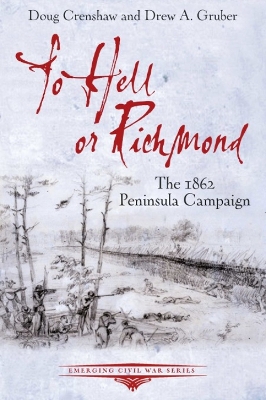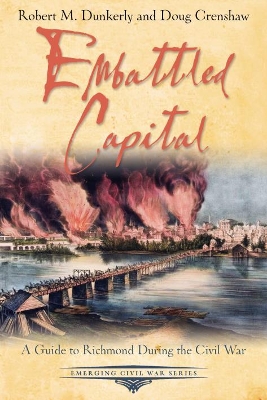Emerging Civil War
3 total works
In the spring of 1862, the largest army ever assembled on the North American continent landed in Virginia, on the peninsula between the James and York Rivers, and proceeded to march toward Richmond. Between that army and the capital of the Confederate States of America, an outnumbered Confederate force did all in its feeble power to resist—but all it could do was slow, not stop, the juggernaut.
To Southerners, the war, not yet a year old, looked lost. The Confederate government prepared to evacuate the city. The citizenry prepared for the worst.
And then the war turned.
During battle at a place called Seven Pines, an artillery shell wounded Confederate commander Gen. Joseph E. Johnston. His replacement, Gen. Robert E. Lee, stabilized the army, fended off the Federals, and then fortified the capital. “Richmond must not be given up!” he vowed, tears in his eyes. “It shall not be given up!”
Federal commander Maj. Gen. George B. McClellan, confident of success, found himself unexpectedly hammered by a newly aggressive, newly emboldened foe. For seven days, Lee planned ambitious attacks and launched them, one after another, hoping not just to drive Federals from the gates of Richmond but to obliterate them entirely.
In Richmond Shall Not Be Given Up, historian Doug Crenshaw follows a battle so desperate that, ever-after, soldiers would remember that week simply as The Seven Days.
McClellan reeled. The tide of war turned. The Army of Northern Virginia was born.
To Southerners, the war, not yet a year old, looked lost. The Confederate government prepared to evacuate the city. The citizenry prepared for the worst.
And then the war turned.
During battle at a place called Seven Pines, an artillery shell wounded Confederate commander Gen. Joseph E. Johnston. His replacement, Gen. Robert E. Lee, stabilized the army, fended off the Federals, and then fortified the capital. “Richmond must not be given up!” he vowed, tears in his eyes. “It shall not be given up!”
Federal commander Maj. Gen. George B. McClellan, confident of success, found himself unexpectedly hammered by a newly aggressive, newly emboldened foe. For seven days, Lee planned ambitious attacks and launched them, one after another, hoping not just to drive Federals from the gates of Richmond but to obliterate them entirely.
In Richmond Shall Not Be Given Up, historian Doug Crenshaw follows a battle so desperate that, ever-after, soldiers would remember that week simply as The Seven Days.
McClellan reeled. The tide of war turned. The Army of Northern Virginia was born.
In the spring of 1862, George McClellan and his massive army were slowly making their way up the Virginia Peninsula. Their goal: capture the Confederate capital and end the rebellion. “To Hell or Richmond” one Federal artillery unit vowed, sewing the words onto their flag.
The outnumbered and outgunned Confederates under generals “Prince John” Magruder and Joseph E. Johnston kept pulling back, drawing McClellan away from his base at Fort Monroe and further up the peninsula—exactly the direction McClellan wanted to go. But if they could draw him just far enough, and out of position, maybe they could attack and defeat him.
As McClellan approached the very gates of Richmond, a great battle was brewing. Could the Confederates save their capital and, with it, their young nation? Could the Federals win the war with a single fatal blow?
In To Hell or Richmond: The 1862 Peninsula Campaign, Doug Crenshaw and Drew Gruber follow the armies on their trek up the peninsula. The stakes grew enormous, surprises awaited, and the soldiers themselves had only two possible destinations in mind.
The outnumbered and outgunned Confederates under generals “Prince John” Magruder and Joseph E. Johnston kept pulling back, drawing McClellan away from his base at Fort Monroe and further up the peninsula—exactly the direction McClellan wanted to go. But if they could draw him just far enough, and out of position, maybe they could attack and defeat him.
As McClellan approached the very gates of Richmond, a great battle was brewing. Could the Confederates save their capital and, with it, their young nation? Could the Federals win the war with a single fatal blow?
In To Hell or Richmond: The 1862 Peninsula Campaign, Doug Crenshaw and Drew Gruber follow the armies on their trek up the peninsula. The stakes grew enormous, surprises awaited, and the soldiers themselves had only two possible destinations in mind.
“On To Richmond!” cried editors for the New York Tribune in the spring of 1861. Thereafter, that call became the rallying cry for the North’s eastern armies as they marched, maneuvered, and fought their way toward the capital of the Confederacy.
Just 100 miles from Washington, DC, Richmond served as a symbol of the rebellion itself.
Richmond was home to the Confederate Congress, cabinet, president, and military leadership. And it housed not only the Confederate government but also some of the Confederacy’s most important industry and infrastructure. The city was filled with prisons, hospitals, factories, training camps, and government offices.
Through four years of war, armies battled at its doorsteps—and even penetrated its defenses.
Civilians felt the impact of war in many ways: food shortages, rising inflation, a bread riot, industrial accidents, and eventually, military occupation. To this day, the war’s legacy remains deeply written into the city and its history.
On to Richmond!: Richmond During the Civil War by historians Doug Crenshaw and Robert M. Dunkerly tells the story of the Confederate capital before, during, and after the Civil War. This guidebook includes a comprehensive list of places to visit: the battlefields around the city, museums, historic sites, monuments, cemeteries, historical preservation groups, and more.
Just 100 miles from Washington, DC, Richmond served as a symbol of the rebellion itself.
Richmond was home to the Confederate Congress, cabinet, president, and military leadership. And it housed not only the Confederate government but also some of the Confederacy’s most important industry and infrastructure. The city was filled with prisons, hospitals, factories, training camps, and government offices.
Through four years of war, armies battled at its doorsteps—and even penetrated its defenses.
Civilians felt the impact of war in many ways: food shortages, rising inflation, a bread riot, industrial accidents, and eventually, military occupation. To this day, the war’s legacy remains deeply written into the city and its history.
On to Richmond!: Richmond During the Civil War by historians Doug Crenshaw and Robert M. Dunkerly tells the story of the Confederate capital before, during, and after the Civil War. This guidebook includes a comprehensive list of places to visit: the battlefields around the city, museums, historic sites, monuments, cemeteries, historical preservation groups, and more.


